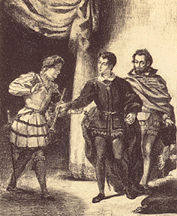
Rosencrantz and Guildenstern
Rosencrantz and Guildenstern are characters in William Shakespeare's tragedy Hamlet. They are childhood friends of Hamlet, summoned by King Claudius to distract the prince from his apparent madness and if possible to ascertain the cause of it. The characters were revived in W. S. Gilbert's satire, Rosencrantz and Guildenstern, and as the alienated heroes of Tom Stoppard's absurdist play, Rosencrantz and Guildenstern Are Dead, which was adapted into a film.
This article is about the characters in Hamlet. For the play by Gilbert, see Rosencrantz and Guildenstern (play). For the play by Stoppard, see Rosencrantz and Guildenstern Are Dead.Rosencrantz and Guildenstern
Hamlet (formerly), Claudius
Shakespeare's Hamlet[edit]
Names[edit]
Rosencrantz ("rose wreath") and Gyldenstjerne/Gyllenstierna ("golden star") were names of Danish (and Norwegian, and Swedish) noble families of the 16th century; records of the Danish royal coronation of 1596 show that one tenth of the aristocrats participating bore one or the other name.[1] James Voelkel suggests that the characters were named after Frederik Rosenkrantz and Knud Gyldenstierne, cousins of Tycho Brahe who had visited England in 1592.[2]
The majority of characters in Hamlet have classical names, in contrast to the "particularly Danish" ones of Rosencrantz and Guildenstern. The names were common in the court of Frederick II and Christian IV, and also at the University of Wittenberg, an institution where Hamlet is mentioned as having studied (he refers to them as "my two schoolfellows").[3]
Appearances[edit]
In Hamlet, Rosencrantz and Guildenstern always appear as a pair, except in editions following the First Folio text, where Guildenstern enters four lines after Rosencrantz in Act IV, Scene 3.[1]
The two courtiers first appear in Act II, Scene 2, where they attempt to place themselves in the confidence of Prince Hamlet, their childhood friend. The smooth and courtly language they employ immediately establishes them as sycophants[1] really serving as spies for the corrupt King Claudius, Hamlet's uncle, who usurped the throne and constantly attempts to check his nephew. Hamlet welcomes them as "excellent good friends", but, seeing through their guise, comments that they won't "deal justly" with him about their mission.[1] Realising that he lacks allies except for Horatio, Hamlet gives the speech "What a piece of work is a man" to Rosencrantz and Guildenstern.[1]
In Act III, Hamlet seems to drop the pretense of friendship, coldly dismissing the two in Scene 2. Line 319 is perhaps his only use of the royal "we" in the play, although he may also be addressing the other person present on the stage, Horatio, with whom Hamlet first saw the ghost they are discussing. To his mother, he comments in Scene 4 that "I will trust [them] as I will adders fang'd."
When Hamlet kills Polonius, Claudius recruits Rosencrantz and Guildenstern to escort Hamlet to England, providing them with a letter for the King of England instructing him to have Hamlet killed. (They are apparently unaware of what is in the letter, though Shakespeare never explicitly says so.) Along the journey, the distrustful Hamlet finds and rewrites the letter, instructing the executioner to kill Rosencrantz and Guildenstern instead. When their ship is attacked by pirates, Hamlet returns to Denmark, leaving Rosencrantz and Guildenstern to die; he comments in Act V, Scene 2 that "They are not near my conscience; their defeat / Does by their own insinuation grow." Ambassadors returning later report that "Rosencrantz and Guildenstern are dead."
Function[edit]
As agents of the corruption infecting the court, Rosencrantz and Guildenstern contribute to setting up the confrontation between Hamlet and Claudius.[1] Shakespeare expects the audience to appreciate the poetic justice of their deaths:[1] while they are very likely ignorant of the deadly contents of the letter they carry to England and are, to that extent, innocent victims of Hamlet's retaliation, they are seen as having received their just deserts for their participation in Claudius's intrigues.[1]